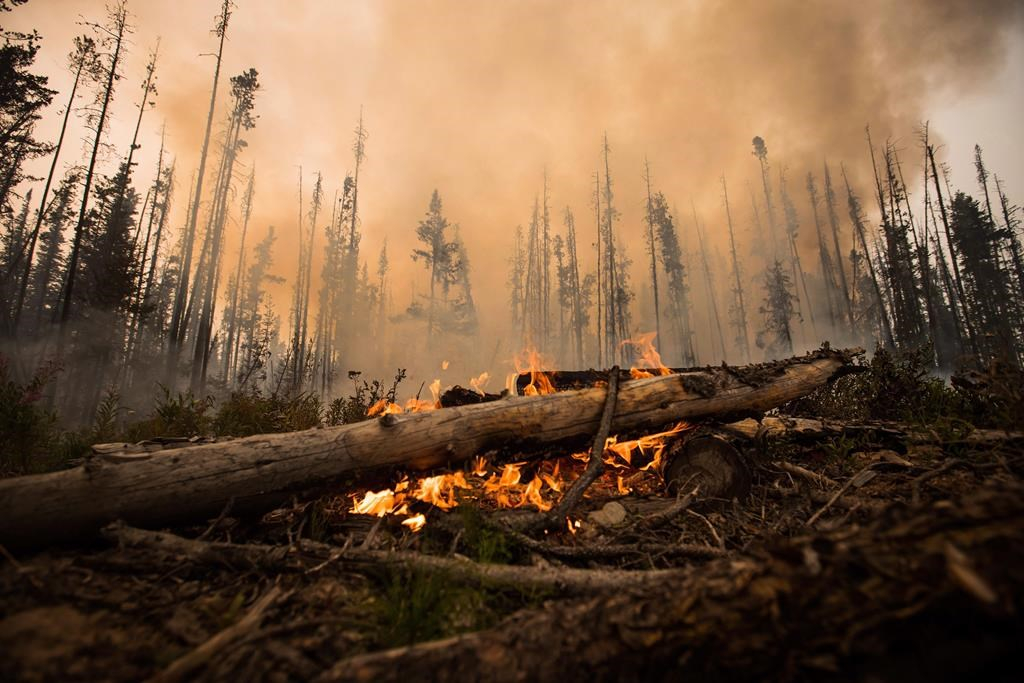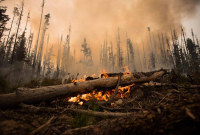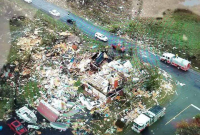Support strong Canadian climate journalism for 2025
Canada is at risk of creating a new class of climate refugees. People are fleeing their homes here in Canada. A transformation is needed before this becomes a trend.
“I just moved east along with my partner and infant daughter, after about 15 years in Alberta,” Georgia Fisher, 34, told journalist Timothy E. Wilson when he interviewed her recently for a National Observer feature on how fires are changing lives.
Fisher’s partner is from Alberta and now makes Peterborough, Ont., her home. “I wouldn’t have begun to consider this move if it weren’t for last summer and all the smoke,” she said.
The environment is emerging as the key issue as the 2019 federal election nears. According to a public opinion poll taken by the Forum Poll, the environment is tied with the economy as the most important issue. One-quarter of those polled say it is the most important issue.
Bruce Blackwell of B.A. Blackwell and Associates, is a forestry and environmental management services company in North Vancouver. Blackwell has 30 years’ experience consulting with communities in the aftermath of wildfires. “This is a 40- to 60-year problem, and it’s not going away,” Blackwell told Wilson. “The fires we are seeing are so big the government doesn’t fight them. Instead, it focuses on getting people out of the way.”
But we still have a long way to go as a country in taking the threat of our warming climate seriously.
In this perilous moment, premiers in Ontario and Alberta and Conservative party Leader Andrew Scheer are marching lockstep but not in the direction scientists tell us the world must go.
As National Observer’s Fatima Syed reported earlier this week, Doug Ford killed 227 clean energy programs since taking office last year. The cancelled projects amounted to about $1.88 billion allocated to projects in municipalities. Alberta Premier Jason Kenney has vowed to create a $30-million "war chest" to fight environmental organizations that advocate for smart climate policies, a move Gary Mason, writing in The Globe and Mail this week, called a battle that Kenney "neither wants or needs."
Even Prime Minister Trudeau admitted this week that the federal government needs to be doing much more to raise awareness in Canada about climate change. But, as the impacts of climate change become ever more tangible, immediate and, for some, simply heartbreaking, premiers Kenney, Doug Ford, Blaine Higgs, Scott Moe and Robert McLeod, along with the leader of Canada’s Conservative party remain tone-deaf on climate and its threat to public health.
Blatant disinformation is increasingly part of the political landscape in North America. U.S. President Donald Trump recently lied about his administration's environmental record, claiming to be a protector of public lands. Flanked by former oil and coal lobbyists he has appointed as head of Interior and the EPA, Trump blasted the Green New Deal while not mentioning climate change once during the speech. Most of the president's claims about the achievements of his administration on clean air, water, oceans and emissions reductions were either exaggerations, outright lies, or attributable to the previous administration, multiple outlets report.
Trump's chaotic leadership style spills across the border every day, inspiring wild, divisive rhetoric and regressive policies in Canada. But don't fall for it.
“I sold my home and got out of it (after the fires),” Darlene Powell, 73, told National Observer. Powell moved from Kelowna, B.C., to Carleton Place, Ont., because “I just couldn’t handle how bad the air quality was. My breathing was getting worse, and I ended up on a puffer to ease the tightness in my lungs.”
Canadians are putting the environment first. Their leaders need to do the same thing.






Comments
People are talking about reversing climate warming which is not the goal. The goal is to arrest climate heating. We are in an elliptical orbit around the sun one that takes us from a circular orbit to a long 5000 years out before we start back to zero again. We are 65 years away from our circular orbit we should be much colder but, we are warming up. The Conservatives have chosen to make this an election issue where there should be none. We will continue on our 5000-year journey at some point we will slam into another ice age.
Solar radiance cycles are factored into all the climate change models in order to determine the size of the human impact on the earth’s energy imbalance. What we are experiencing is NOT part of natural cycle and we must stop making the problem worse by adding greenhouse gases to the atmosphere.
Thanks for your comment, John.
Thankful for the National Observer. Your articles make sense while so many others indicate that we are powerless against the Oligarchs. How can anyone believe the markets will save us now?
" Prime Minister Trudeau admitted this week that the federal government needs to be doing much more to raise awareness in Canada about climate change"
How about he inform himself? He has absolutely zero excuse for the policies he's pursued in re the environment and climate change vis a vis carbon fuels: or did he not realize he had a majority government? Given the administration's habit of lying and bluffing, I hope that between the Conservatives and Liberals, they do not constitute a majority in the next election. When push comes to shove, the Liberals' policies haven't been much different from those of their predecessors. They talk a great line abroad. But back at home? Wafflegab about paying for greening with fossil fuel profits.
Thank you National Observer for gathering so much of the information in one place.